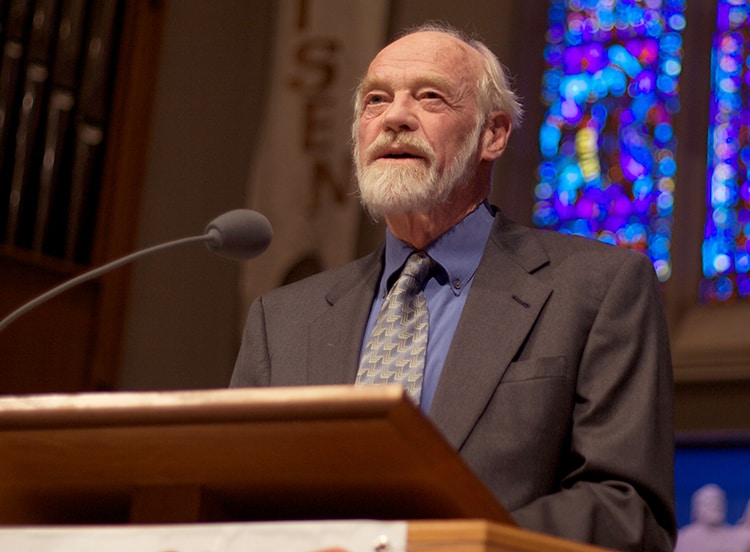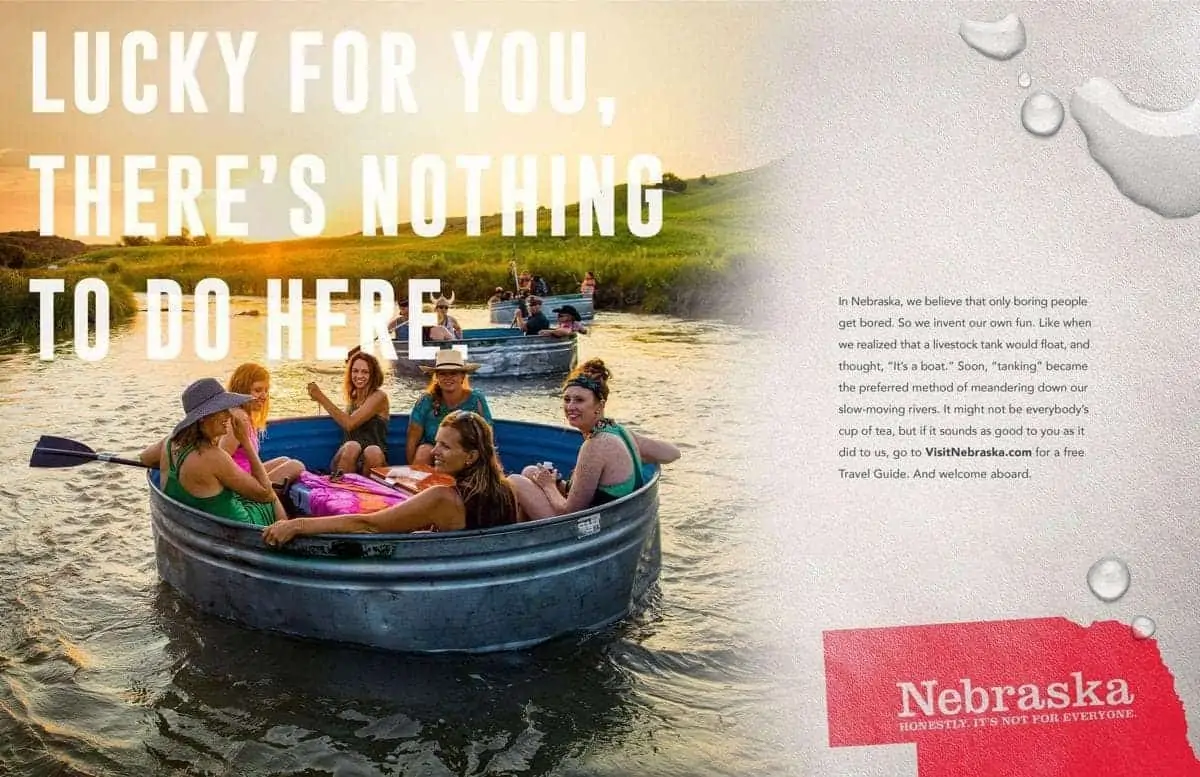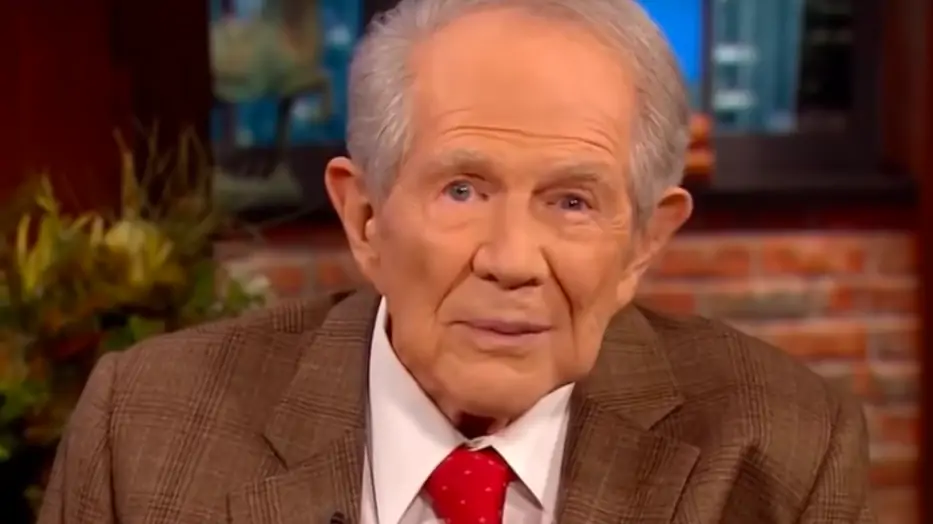
Editor’s Note: The piece originally ran on Eugene Peterson’s 85th birthday. This weekend, he entered hospice care.
This week marked Eugene Peterson’s 85th birthday, so I thought this would be a great occasion to share a little of what friendship with Eugene and Jan Peterson has meant to me over the years.
At the end of August, I went to spend two days with them at their home. Though I’ve met up with them a few times at retreat centers across the country, this was my fifth visit to their home in Montana. Every time I had gone to their house before this trip, they were in a position to receive me with some semblance of strength. On my first visit, Eugene was a vibrant 77-year-old who had just finished writing Practice Resurrection: A Conversation On Growing Up In Christ.
That was the fifth manuscript he’d written in five years. His mind was energized and energizing to me, his young interlocutor. He would rattle off exact quotations from Kierkegaard and von Balthasar, Torrance and von Hügel. To be with him was to be invigorated. I remember all those flights into that modest little airport in Northern Montana. I would find myself looking out the window like a giddy 7-year-old boy on his first trip to Disney. I can’t believe I get to be here!
But the trip in August was different. Instead of that giddy feeling of going to visit a legend in the faith, a literary icon whose 40-plus books I have devoured, I felt the sober seriousness that one feels when he gets to visit an aging grandparent. It was one of those trips you take because you don’t know how many more of these you’ll get.
I showed up at their place that afternoon and they were sitting in the front room. Jan, with that perfectly gentle voice of hers, was reading Eugene one of their favorite novels. The front windows were slightly opened and I could hear her voice as I walked down the steps to their front door. We spent the afternoon together catching up and doing small jobs around the house. I noticed a few light bulbs were out, so I changed them. I took out the compost while Jan picked some basil from their herb garden. We made dinner. The stuff of life.
After breakfast on the second morning, Eugene retreated for a couple minutes and came back out wearing his swim trunks. He threw me an extra pair and said he wanted to go for a morning swim in Flathead Lake.
We walked out the back door and down to the dock—I, walking beside him the whole time as we took the steep decline, instinctively holding his slender arm, ready to catch him in case the dirt slid out from beneath him. I did not ask for permission to hold his arm, but wondered if I should have. Earlier in life, Eugene was a fantastic athlete, having run over 20 marathons. Was my taking his arm just another one of the thousand reminders that life for him is changing, that strength is waning? But almost right away I could sense his gratitude at the gesture, and I knew we were OK.
We got to the dock, threw our towels down, and Eugene shuffled over to the edge of the dock, his toes hanging over the side. In that moment, everything stopped and my imagination flashed back 70 years to Eugene as a teenager, diving into this water, his father standing behind him and bellowing out that laugh that can only come from a proud dad. Eugene grew up swimming the Flathead. This is his family’s place. In fact, his teenage years were spent helping his dad build the little cabin that he and Jan live in today.
He rocked back and forth a couple times, measuring what the jump would require, leaned over and dove in.
We spent the day walking, looking through his library, praying, kayaking and talking. Twelve hours of talking. I have always loved spending time with people in their 80s and 90s because I know they are a treasury of experiences, so I came ready with questions.
I asked Eugene about a lot of things, but I stumbled onto something. I wanted to know what he has learned about money. To give a little context, this is a guy who translated a Bible that has sold over 17 million copies. I was interested to know what that has taught a guy who grew up in a modest home during the Great Depression, in a hard-working, small-town community, who himself lived paycheck-to-paycheck for most of his working years.
Eugene was totally silent for about 60 seconds. He was rubbing his fingers through his grey beard and staring off into the distance across the lake where the Rocky Mountains are in view. Through so many of these moments with Eugene over the years, I have learned to wait through the long pauses.
It seemed like he had gathered a thought.
“I don’t think I’ve learned anything about money,” he said. And then he went silent again. I waited, but I was thinking, What do you mean you haven’t learned anything about money?
Then it hit me. This is a guy who lives in his childhood home. They have one car, a Honda. There is not an ostentatious bone in their bodies. These are people who have turned down opportunity after opportunity in order to preserve a life of simplicity and quiet faithfulness. A long obedience in the same direction. I have long said that it only took Eugene Peterson 65 years to become an overnight success, and the success came when he had gotten over his need to be successful. God must have known he could trust this old couple with that kind of money, that kind of acclaim.
What I discovered is that Eugene and Jan have been doing this their whole lives, been giving themselves away, their strength away, their money away. I basically made him admit that he and Jan have paid for scores of his students to pursue Masters or Doctoral degrees. Full scholarships out of their own pockets.
“We determined that that’s why God gave us this money. That’s what it’s for,” he said. They have given to local and global mission work. As the Psalmist said, “They have freely scattered abroad their gifts to the poor, their righteousness endures forever; their horn will be lifted high in honor” (112:9).
Eugene and Jan could have gone the traditional retirement route that is the last stretch on the highway to the American Dream and no one would have blamed them. They could have circled the wagons and shut everyone else out. They could have spent that money on themselves. But they haven’t.
At the end of our second day together, I asked if I could pray for Eugene and Jan. But I took it a step further, asking if I could anoint their heads with oil. There is an unmistakable significance to oil throughout scripture.
It’s the way people were “set apart” as holy unto the Lord, and it signifies the “oil of gladness” for which every human being is longing. This felt like a big thing to ask, a younger person asking to anoint a sage. They were emotional as they said yes, of course, I could anoint them with oil. “Father, let them feel it deep down in their bones, that ‘Well done, good and faithful servant.’” It was a moment I will never forget.
Then Eugene got up and went to the other room. He came back in carrying his own bottle of anointing oil. He cracked that thing open, the room immediately filling with that unmistakable smell of frankincense. He anointed me with oil and he and Jan prayed for me. He prayed so many wonderful things, but as he prayed this line stood out to me:
“Father, help Jan and I to take what’s left with us and share it with those around us … Help us give it all away.”
Of all that I have learned from Eugene and Jan Peterson over the years, maybe that’s the thing that will stick with me the most: that true life is found as we become like Jesus, as we spend our lives giving it all away.
Editor’s Note: Daniel Grothe is a friend of the Peterson family.






















